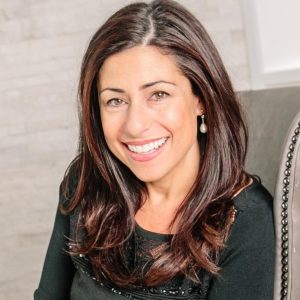5 Lessons Learned from an Ovarian Cancer Survivor
Editor’s Note: Blog written by MyLifeLine.org founder and ovarian cancer survivor, Marcia Donziger. She shares 5 of the lessons learned after she was diagnosed with ovarian cancer at age 27.

Marcia Donziger
In 1997 I was 27, happy, free, and traveling the world as a flight attendant. Newly married and ready to have a baby, I felt strong and invincible. My future was unfolding just as I expected it to. Until the symptoms appeared ever so subtly. Squeezing cramps around my waist. It hurt to pee. After a few weeks, I marched my invincible self into my doctor’s office, told her I diagnosed my own bladder infection, and may I please have antibiotics.
She decided to investigate a little further. After an ultrasound, she discovered a grapefruit-sized tumor growing on my left ovary. “Could it be cancer?” I asked. “No,” my doctor assured me, “you’re too young to have cancer.”
Surgery was scheduled to remove my “benign tumor.” I was excited to get it over with, so I could go on with my life and have babies. After 5 hours of surgery, I woke up in the recovery room, my body uncontrollably thrashing in pain. My doctor hovered over me and broke the news, “I’m sorry. You have ovarian cancer. You’ve had a complete hysterectomy. We took everything out.”
What I heard loud and clear was “Cancer. You can’t have children.”
The diagnosis came as a shock. Stage IIIC ovarian cancer had taken over my abdomen, resulting in an emergency hysterectomy that I was not prepared for. The intense grief hit immediately. The loss of my fertility was most crushing. I had always wanted to be a mom.
Halfway through chemo treatments, I celebrated my 28th birthday, but there wasn’t much to celebrate. My marriage was dying. Cancer puts tremendous stress on a couple. Some couples can handle it together like champs. We didn’t. We divorced 1 year from the date of my diagnosis.
After treatment ended, I looked in the mirror to see what was left. I was 28 years old, ravaged physically and emotionally, divorced, and scared to date as a woman unable to have children. Who would love me now?
Now, almost 20 years later, I feel strong again (although not invincible).
With the benefit of time and perspective, I’ve distilled that traumatic cancer experience into 5 life lessons:
- Trust grandma’s reassurance, “This too shall pass.” As an ovarian cancer survivor herself, my grandma is living proof of this timeless wisdom. Stressful events don’t have to be permanent. We don’t have to be victims. Although cancer is extremely painful and unwelcome, the bright spot is we are forced to build character traits such as resiliency, emotional courage, and grit.
- Create your own joy in the midst of crisis. There are ways to uplift yourself during the chaos of cancer treatment. For example, I took a pottery class throughout my chemo months to find solace in distraction and art, which helped soothe my soul and ease the journey. What would make you happy? Do some-thing just for you.
- Stop doing what you don’t want to do. If you were doing too much out of obligation beforehand, try to change that. You are only obligated to make yourself happy. No one else can do that for you. The key is to use this wisdom to prioritize your time and honor yourself, so you can be healthy for others. Drop what doesn’t serve you. Drop the guilt. Life will go on.
- Connect with others. The emotional trauma is hard to measure in a medical test, but it’s real. Anxiety and depression can go hand-in-hand after cancer—it did for me. In response to the emotional challenges I experienced, years later I founded MyLifeLine.org Cancer Foundation to ease the burden for others facing cancer. MyLifeLine.org is a cancer-specific social platform designed to connect you with your own family and friends to ease the stress, anxiety, and isolation. Gather your tribe on MyLifeLine. You are not alone.
- You are lovable after cancer. No matter what body parts you are missing, you deserve love just as you are. Cancer tore down my self-esteem, and it took significant effort to build it back up. I am dedicated to personal and professional growth now. Look into your heart, your mind, your spirit. Try fine-tuning your best character traits, like generosity or compassion. Never stop growing and learning. We are not defined by the body.
To wrap up my story—I learned that when one door closes, another opens. Today I am the proud, grateful mother of 11-year-old twin boys. Born with the help of a surrogate mom and an egg donor, my dream finally came true of becoming a parent. Where there is a will, there is a way. Never give up on your dreams!
About MyLifeLine.org: MyLifeLine.org Cancer Foundation provides free websites to connect cancer patients with family and friends so patients feel supported. To learn more about how MyLifeLine.org can help you or someone you know affected by cancer, please visit www.mylifeline.org.



